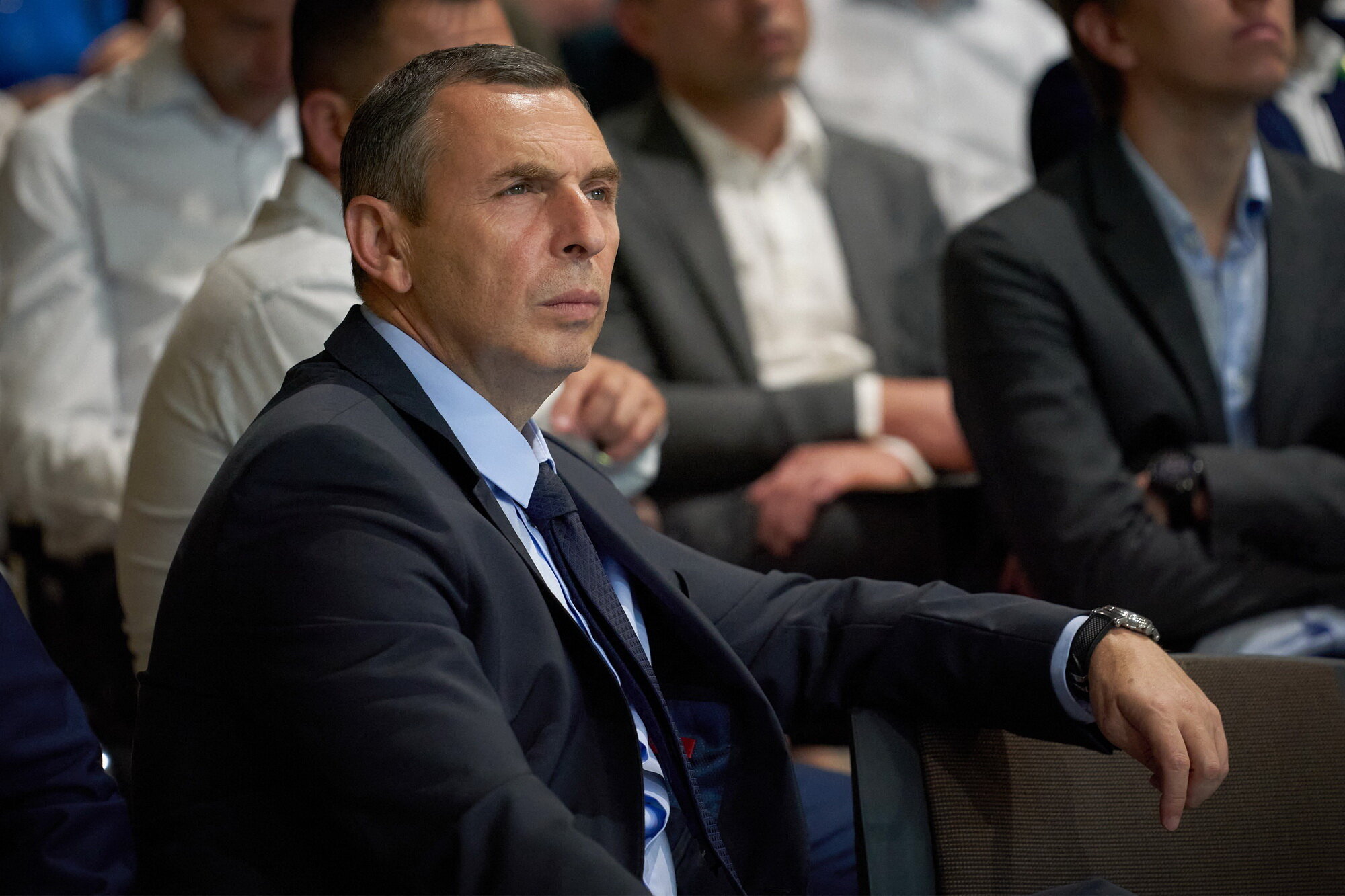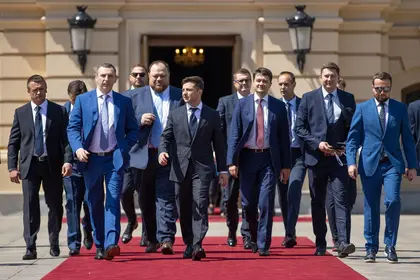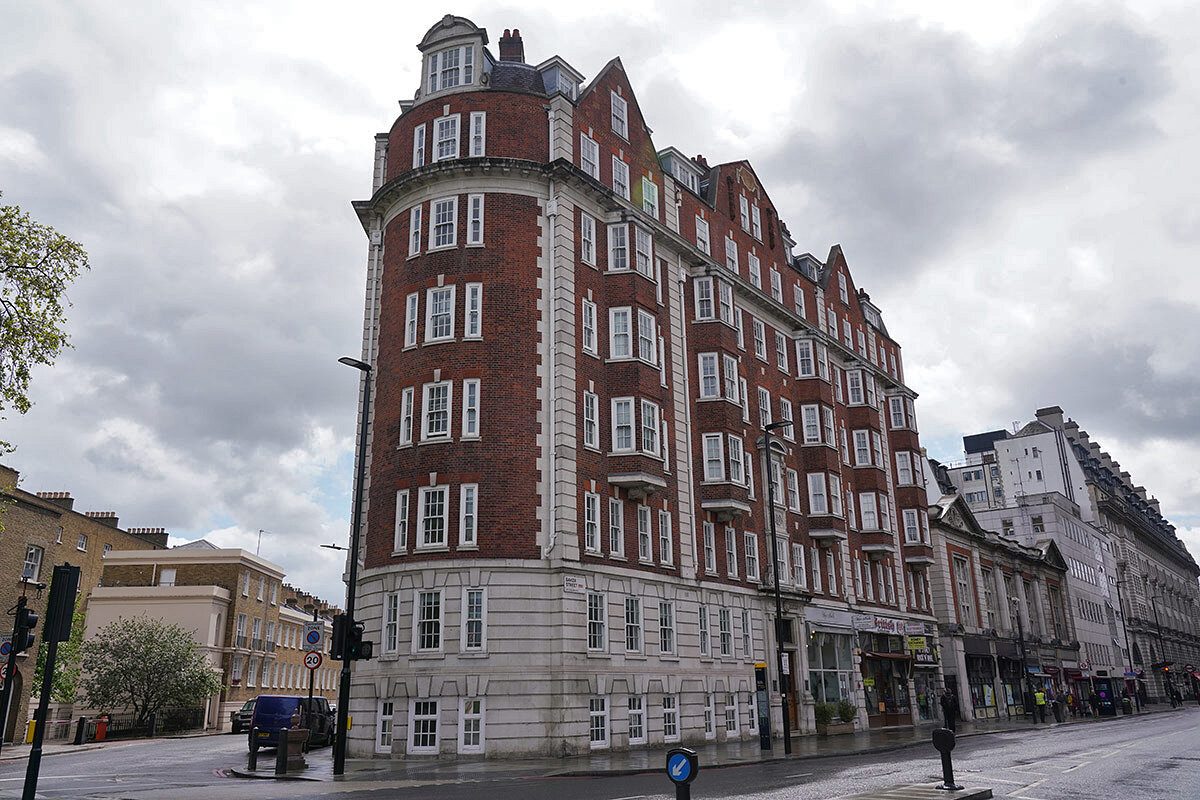Some things never change in Ukrainian politics, where power brokers with offshore wealth hold the reins. The Pandora Papers, the world’s biggest leak of secret international finances, serves as a timely reminder.
President Volodymyr Zelensky got elected as the avatar of reform, popularized by his TV character Vasyl Holoborodko, purportedly the only honest man in Ukrainian politics.
JOIN US ON TELEGRAM
Follow our coverage of the war on the @Kyivpost_official.
Zelensky promised to take down the oligarchs with their untouchable offshore assets and break their magic walls of influence throughout the country.
The Oct. 3 revelation that Zelensky has his own impregnable offshore assets of ambiguous legality was yet another blow to his already damaged reputation.
The 12 million files analyzed by the International Consortium of Investigative Journalists revealed, among others, the international financial schemes of 38 highly placed Ukrainians, the most of any country.
These papers show that Zelensky and his friends set up their chain of offshore companies when they still produced comedy shows, long before they ever considered going into politics.
When Zelensky was about to be elected president in 2019, he handed his share over to his closest adviser, Serhiy Shefir. But the papers revealed that under their arrangement, dividends would keep flowing to a company owned by Zelensky’s wife Olena. Much of these assets went undeclared. Lawyers and experts said that the legality of this is dubious.
What’s more troubling is that there’s also evidence that Zelensky’s offshore companies received payments from entities connected to Ihor Kolomoisky, the billionaire oligarch that airs Zelensky’s shows.
Some of that money may have been stolen by Kolomoisky through PrivatBank from Ukrainians. Thus far, Kolomoisky has faced no criminal charges in the $5.5 billion bank fraud that forced Ukraine to bail out the nation’s largest bank and take ownership in 2016, although he faces civil lawsuits and at least one criminal investigation in the U.S.
These revelations show that far from being different, Zelensky is a lot like his arch-rival, the oligarch and former President Petro Poroshenko, who was revealed to have a massive offshore network in the previous Panama Papers leak in 2016.
Zelensky is also not dissimilar to other oligarchs he vowed to take down.
Offshore schemes
Zelensky and his colleagues in the entertainment company Kvartal 95 created about a dozen interlinked offshores in 2012.
The main entity was Maltex Multicapital Corp. Zelensky and his wife Olena allegedly owned 25% through the company Film Heritage. Each of the Shefir brothers, Serhiy and Borys, owned a quarter; Kvartal 95 manager Andriy Yakovlev had the remaining 25%.
In 2017, a company called Davegra Ltd became the nominal holder. It was owned by Zelensky’s childhood friend Ivan Bakanov, who now heads the Security Service of Ukraine. Bakanov had signed a trust declaration, possibly to hide Zelensky’s true ownership.
In 2019, Zelensky handed his share of Maltex for free to Serhiy Shefir, who became his closest aide when he assumed office. According to the leaked documents, Maltex would remit payments to Film Heritage Ltd, SHB Ltd, SHSN Ltd and Candlewood Investments Ltd.
The main payments would be paid to shareholders as dividends.
In 2019, Zelensky’s wife became the sole shareholder of Film Heritage, according to the asset declaration registry, meaning Zelensky’s family would continue to collect income despite ostensibly being divested of the firm.
The leaks don’t contain any information showing whether any dividends have actually been paid.
Zelensky has not mentioned Maltex in any of his public asset declarations, not even in 2018, when he still owned 25% of the company.
Companies from the network also bought swanky London property, including several apartments worth $2.28 million, $2.3 million and $3.5 million.
The responses
Poroshenko exploited the revelations about Zelensky’s circle during a meeting of parliamentary faction heads.
“Today, the entire world is talking about the international crimes of the top leadership of the state and personally Volodymyr Zelensky,” he said, despite being in the same position five years ago. “Because of the actions of President Zelensky, Ukraine has gained a worldwide reputation of a state whose leader is involved in global corruption.”
Zelensky’s side was quick to say that all this information has already been publicized and there’s nothing compromising about it. Mykhailo Podolyak, who advises the head of the President’s Office, told the Babel news outlet that the revelations have “absolutely nothing to do with money from the state budget or state positions,” he said, hence “there is nothing serious to comment on.”
Podolyak said Zelensky took his businesses offshore to protect them from “aggressive actions of the authorities at the time.” Indeed, the offshore network was created in 2012 under former President Viktor Yanukovych, when government-sanctioned raids and takeovers were rampant, making offshore schemes very attractive. Yanukovych fled power on Feb. 22, 2014, during the EuroMaidan Revolution.
“In fact, journalists once again confirmed the unconditional compliance on the part of the president with the anti-corruption norms of national legislation,” Podolyak told Babel.
Reached for comment by the Kyiv Post, Zelensky’s spokesperson Serhii Nikiforov declined to talk about Zelensky’s companies.
“This is a question for lawyers,” he said. “It’s not something I’d be able to comment on.”
Shefir and Bakanov could not be reached for comment.
Was it legal?
Graham Barrow, a U.K. based expert who tracks financial crimes and money laundering schemes, said this is a typical arrangement.
“This type of scheme works on the basis of trust between business associates or family members and it’s very common,” he explained. “It is why virtually every country in the world has legislation which requires banks to check the bona fides of not just politically exposed persons (or PEPs), but their relatives and close associates, because it’s so commonly used.”
Barrow added that there could be hidden powers of attorney covering the transfer of dividends and ultimate ownership. “It is not uncommon for ‘proxies’ to sign powers of attorney which gives the donor the right, at any time, to take back ownership or receive dividends. It’s hard to tell if this is the case,” he said.
Martin Woods, a financial crimes expert, told investigative outlet Slidstvo.info that the dividends arrangement smacks of illegality. He also told journalists from the Organized Crime and Corruption Reporting Project that the transfer may have been a charade to hide Zelensky’s stake in Maltex, allowing him to keep making money from it.
Ukrainian lawyer Vitaly Tytych agreed, saying it may have been a fake deal to let Zelensky remain the de-facto owner with Shefir as frontman. He said if any dividends have been paid to Olena Zelenska, failure to declare them may be a crime.
It’s not yet clear whether the companies were involved in anything outright illegal. “There is too little information to draw conclusions,” Olena Shcherban, a lawyer at the Anti-Corruption Action Center, told the Kyiv Post.
Barrow thinks “It’s a very difficult question to answer and walks the fine line between illegal and immoral.”

Shefir managed to get around declaring his offshore company thanks to a law that exempts “freelance” advisors from filing asset declarations. Shefir’s status is unclear — Zelensky has never specified if he’s part of his permanent staff.
“Shefir has a lot of influence but doesn’t file declarations,” Shcherban said. “This is not a logical norm. He’s a top state official.”
Kolomoisky’s money
During the 2019 presidential election campaign, Poroshenko’s ally Volodymyr Ariev alleged that Zelensky got over $40 million from Kolomoisky’s companies.
The investigation partly confirmed these claims. Leaked documents show that 10 companies match the ones described by Ariev.
The financial flows appear to come from Kolomoisky-linked companies. For example, in May 2013, SVT Films Ltd, a company half-owned by Maltex, was to be paid $1.2 million in licensing fees by an offshore company linked to Kolomoisky’s media holding 1+1 for the show “Make a Comedian Laugh.”
In 2015, company Gimentiano Holdings Ltd, owned by Zelensky’s friend Iakovlev, got $750,000 from the Cyprus branch of PrivatBank, which Kolomoisky owned at the time.
The Cyprus branch was the primary gateway through which Kolomoisky moved the $5.5 billion he allegedly stole in Ukraine.
Barrow said that looking at the convoluted structure of these transactions made him suspicious.
“Wherever I see arrangements with unnecessary complexity, especially when that complexity involves additional time and expense, it raises a red flag,” he said.
“Why would a businessperson, usually driven by the need to generate profit, involve themselves in an arrangement which was complex, time consuming and costly, when a simpler cheaper method was available? Too often, the reason is that they want to avoid public scrutiny of an arrangement which is hard to justify.”
Prosecutor General Iryna Venediktova stated that anything related to PrivatBank has been examined under a microscope and the Pandora Papers have not revealed anything new on that count. If there was a crime related to the president, it would have been caught by now, she seemed to imply.
However, Venediktova has consistently been loyal and obedient to Zelensky, something which has been roundly criticized by legal watchdogs.
Stained legacy
If the legality is ambiguous, the morality may be starker, observers said.
Zelensky had a “political responsibility” not to maintain shady offshore networks, said Anatoly Oktysiuk, a political analyst at Democracy House. Zelensky came in saying he’d change things, but he revealed himself to be typical, which will dog the remainder of his political career.
“He’s the same as Petya,” said Oktysiuk, using the diminutives of Petro Poroshenko’s and Volodymyr Zelensky’s first names. “Vova’s no longer an ordinary guy but an offshore crook like the rest of the old elites. And this will be the main political narrative.”
Yevhen Mahda, director of the Institute of World Policy in Kyiv, disagrees that this will hurt the president’s reputation.
“Pandora Papers will not significantly affect voter confidence in Zelensky. His rating will not fall so low as to allow his opponents to call for early elections,” the political analyst told the Kyiv Post.
Political expert Viktor Bobyrenko also believes that the Pandora Papers will reduce Zelensky’s rating but will not bring him down. “Zelensky has a 15–17% stable electoral base, which will not be affected by anything,” he told the Kyiv Post.
He also does not expect the investigation to get much play in Ukraine’s oligarch-controlled mainstream media.
As for legal consequences, they are equally unlikely, even if Zelensky’s companies are revealed to have been breaking the law.
Poroshenko has been investigated for tax evasion using his offshore holdings but the former president, who leads the opposition faction European Solidarity has so far not faced prosecution.
You can also highlight the text and press Ctrl + Enter





